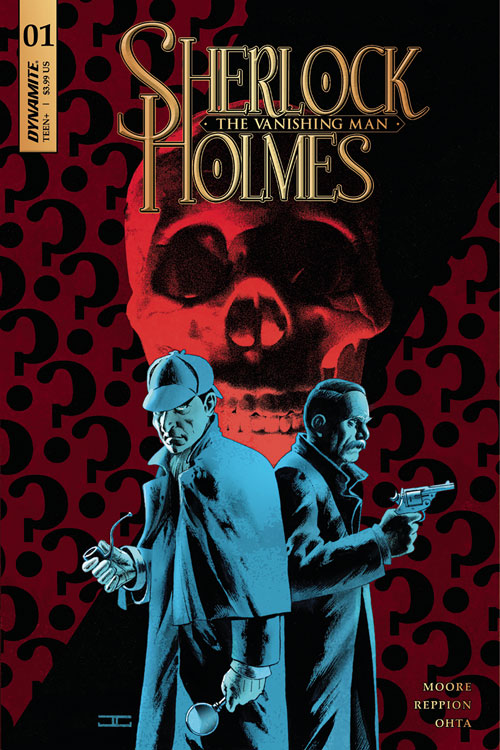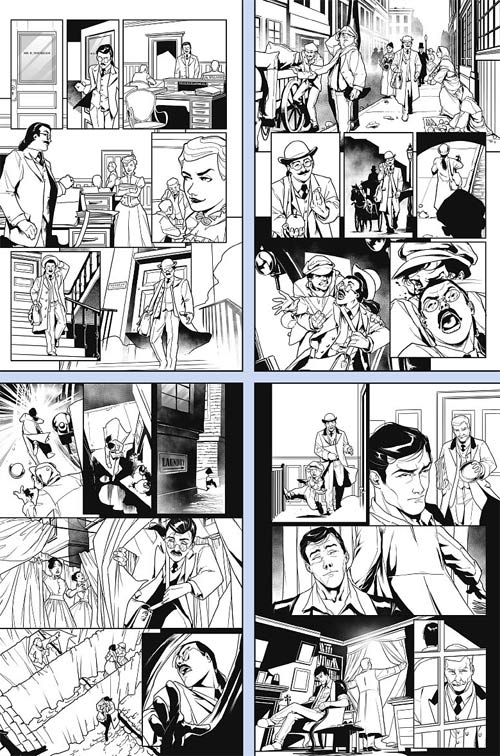Holmes Hounded By Home-Grown Horrors
Apr 28, 2018
 |
by Vince Brusio
Hardwired to solve crime in the way that London’s finest can never duplicate, the world’s most famous detective is back in Sherlock Holmes: The Vanishing Man #1 (MAR181407) from Dynamite Entertainment. It is a mystery, however, that depicts Holmes’ crimefighting skills before he is at the top of his game. He makes mistakes. He is uncertain. The question is will the world’s greatest mind be able to do his job without collateral damage? Writer Leah Moore takes point to answer that question and more in this PREVIEWSworld Exclusive interview!
Sherlock Holmes: The Vanishing Man #1 (MAR181407) is in comic shops May 2.
**********
Vince Brusio: What was your earliest impression of Sherlock Holmes, and how do you see the character differently today?
Leah Moore: I think my earliest introduction to Holmes must have been as a parody, in kids TV or a comic somewhere. I don’t think I actually watched a Holmes film or read a book until I was an adult. Holmes for me is always the Basil Rathbone incarnation, and it’s his intonation that I write him with. It’s great fun to write because he says things in little chunks. He doesn’t get into a conversation ever, just makes observations. I think the way Holmes is shown on the TV now, with Benedict Cumberbatch and Robert Downey Junior, they play up the qualities that suit the medium, so RDJ brings all the suave physicality to it, with all the stunts and the Bartitsu stick fighting and stuff, but Cumberbatch delivers the haughty lack of social skills. He plays up the lack of humanity, and his face and manner is great for that. You don’t doubt he's an awkward genius for a moment. It makes all his interaction with Watson really heart rending because Watson clearly understands the human condition a lot better than Holmes, even if he doesn’t always keep up with the deductions.
Vince Brusio: Give us a timeframe for this adventure. Where does the story take place? What is life like on the streets?
Leah Moore: We have set this story back in London in the 1890's, so it’s classic Holmes really. We did our best to drag him off to the wilds of Liverpool with the last book, but we were sat thinking about what we wanted to do with this one, and we realized we hadn’t used some of the really classic Holmes things. We hadn’t addressed his on-again off-again drug use, or his relationship with the Baker Street Irregulars. We hadn't really pitted him against a London criminal at all, we had always made an outside influence the problem. This time, all the twists and turns, all the problems, all the crimes are completely home grown. Holmes is up against London itself in this book, and I'm not sure yet if he wins or not.
Vince Brusio: There are four preview pages shown on page 337 of the March PREVIEWS catalog. What is happening in these pages, and how are they representative of the Sherlock Holmes: The Vanishing Man #1?
Leah Moore: The first three pages seem mundane to begin with, just a clerk in a solicitors finishing work for the day and making his way home, but for some reason, he doesn’t get home, he is pursued through the streets and back alleys of London and then vanishes into thin air. The series is about where he went, and why he was chased, and what happened to him next, and what happens to his family, and what part this tiny event might play in the grand scheme of things. What significance is this clerk to the great noisy machine that is London? Holmes has to unlock the mystery and the clerk is the key.
Page 6 is a little moment that seems completely mundane, too. Holmes sends a boy on an errand and unwittingly propels the boy into the gravest danger, into the heart of darkness. He is a plucky lad, but Holmes has no idea what he has asked of his young friend. This is a lesson that Holmes needs to learn.
Vince Brusio: Where is Holmes in his career tenure for this story? Where is he personally? Is he comfortable in his own skin? Self-assured? Cocky? Or does he try to not let people get too close to him less they see there may be an uneasiness about him? As we know, in Victorian times, the sale of opium, laudanum, cocaine, and morphine was legal. In literature, Holmes was said to partake of such substances for “the dull routine of existence.” Will we see this side of him, or do you consider it a distraction from your story?
Leah Moore: Holmes seems to use substances as a distraction, but also maybe to meditate and think deeper about all the million things buzzing about in his head. He seems to exist in a state of nervous fidgeting where he requires a problem to focus on to relax, but then once he has one, he is extremely active and agitated and cannot stop until it is solved. He cannot ever rest easy, or unwind, so I think the drugs slow his mind down long enough for him to rest a bit. I don’t know as his friends would see that as a useful thing, but it’s certainly a part of his character we are trying to address in this book. He is a genius, but he has his flaws and his distractions, and obsessions, and those things can get in the way of his famously rational and critical mind.
Vince Brusio: What is the most rewarding aspect of writing this story? Why are you drawn to writing about a character so far removed from modern times?
Leah Moore: I think that writing historical fiction of any kind allows a writer to look at the world as it was, and maybe draw parallels with the modern world, maybe showcase some things that really haven’t changed, or things that definitely have. It’s a great benefit when you are plotting a story to have a load of restrictions in place to work within, and I would say Holmes provides a really fun set of restrictions. When we write Holmes we have to be really clever and weave a good believable mystery plot, but at the same time, it has to be hard enough that Holmes can't solve it right away (not for three and a half issues at least) and yet satisfying when he does solve it. My favorite thing about writing Holmes is the fact that Holmes is a giant brain, he’s a mind, he can link ideas and store information very accurately, and draw conclusions. Watson, on the other hand, is a heart. He gets angry, or outraged, or sad, he falls in love and marries, he feels compassion, he is brave, and would never let his friend down. They come together in a unique way that writers and the readers alike find completely absorbing. They are a classic double act, a dream team. This is our third Holmes GN, but we are never going to get sick of wiring him. How could we?
 |
**********
Vince Brusio writes about comics, and writes comics. He is the long-serving Editor of PREVIEWSworld.com, the creator of PUSSYCATS, and encourages everyone to keep the faith...and keep reading comics.




